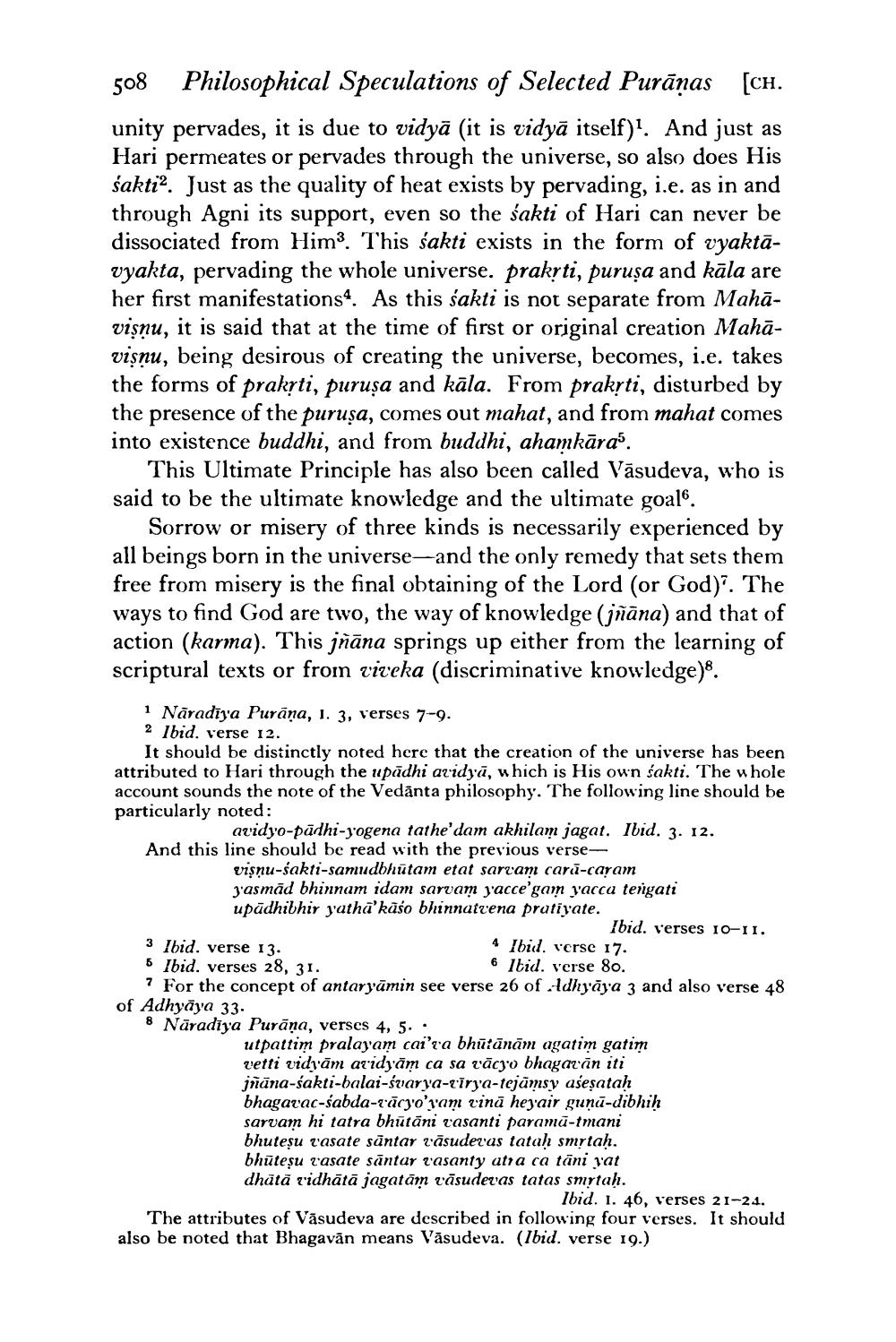________________
508 Philosophical Speculations of Selected Purānas [CH. unity pervades, it is due to vidyā (it is vidyā itself)". And just as Hari permeates or pervades through the universe, so also does His sakti. Just as the quality of heat exists by pervading, i.e. as in and through Agni its support, even so the sakti of Hari can never be dissociated from Him. This sakti exists in the form of vyaktāvyakta, pervading the whole universe. prakrti, purușa and kāla are her first manifestations. As this sakti is not separate from Mahāvişnu, it is said that at the time of first or original creation Mahāvişnu, being desirous of creating the universe, becomes, i.e. takes the forms of prakrti, purusa and kāla. From prakrti, disturbed by the presence of the puruşa, comes out mahat, and from mahat comes into existence buddhi, and from buddhi, ahamkāra'.
This Ultimate Principle has also been called Vāsudeva, who is said to be the ultimate knowledge and the ultimate goale.
Sorrow or misery of three kinds is necessarily experienced by all beings born in the universe—and the only remedy that sets them free from misery is the final obtaining of the Lord (or God). The ways to find God are two, the way of knowledge (jñāna) and that of action (karma). This jñāna springs up either from the learning of scriptural texts or from viveka (discriminative knowledge).
1 Nāradīya Purāna, I. 3, verses 7-9. 2 lbid. verse 12.
It should be distinctly noted here that the creation of the universe has been attributed to Hari through the upādhi aridyā, which is His own sakti. The whole account sounds the note of the Vedānta philosophy. The following line should be particularly noted:
avidyo-pādhi-yogena tathe'dam akhilam jagat. Ibid. 3. 12. And this line should be read with the previous verse
visnu-sakti-samudbhūtam etat sarvam cara-caram jasmād bhinnam idam sarvam j'acce'gam yacca tengati upādhibhir yathā'kāso bhinnattena pratiyate.
Ibid. verses 10-11. 3 Ibid. verse 13.
4 Ibid. verse 17. 5 Ibid. verses 28, 31.
6 Ibid. verse 80. 7 For the concept of antaryāmin see verse 26 of Adhyāya 3 and also verse 48 of Adhyāya 33. 8 Nāradiya Purāņa, verses 4, 5..
utpattim pralayam cai'ra bhūtānām agatim gatim vetti vidyām avidyām ca sa tācy'o bhagavān iti jñāna-sakti-balai-švarya-tirya-tejūmsy aseşatah bhagavac-sabda-Taco'yam vinā hej'air gunu-dibhih sarvam hi tatra bhūtāni rasanti paramu-tmani bhutesu rasate sāntar tāsudevas tatah smrtah. bhūtesu lasate sāntar l'asanty atraca täni vat dhātā tidhātā jagatām vasudev'as tatas smrtah.
Ibid. 1. 46, verses 21-24. The attributes of Vasudeva are described in following four verses. It should also be noted that Bhagavān means Vāsudeva. (Ibid. verse 19.)




